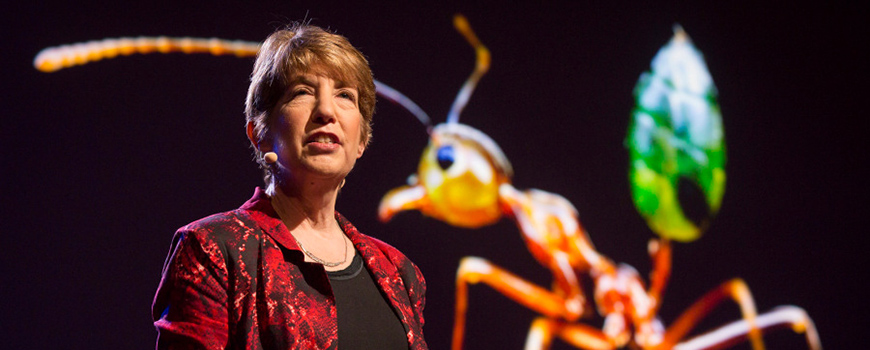Global S&T Development Trend Analysis Platform of Resources and Environment
| Scripps Lecture: What Evolution Really Tells Us About Sex, Diet and How We Live | |
| admin | |
| 2018-01-29 | |
| 发布年 | 2018 |
| 语种 | 英语 |
| 国家 | 美国 |
| 领域 | 资源环境 |
| 正文(英文) |  Marlene Zuk at TEDWomen 2015 presentation Where do society’s assumptions about ideal diets, clothing, lifestyle, and mating choices come from? Marlene Zuk, a professor in the College of Biological Sciences at the University of Minnesota, will separate myths from what scientific evidence suggests about human hardwiring at the 12th Richard H. and Glenda G. Rosenblatt Lectureship in Evolutionary Biology at Scripps Institution of Oceanography, UC San Diego. The talk is scheduled for 2 p.m. on Feb. 8, 2018, at the Robert Paine Scripps Forum for Science, Society, and the Environment (Scripps Seaside Forum) on the Scripps Oceanography campus (8610 Kennel Way, La Jolla, CA 92037). The event is free and open to the public with seating available on a limited basis. People often incorrectly assume that from a biological standpoint, humans are meant to live as they did in prehistoric times as evidenced by “caveman” or “paleo” diets. Zuk and other biologists argue that the assumption fails to consider that humans never stop evolving in response to their environment. She will discuss her 2013 book “Paleofantasy: What Evolution Really Tells Us About Sex, Diet and How We Live,” which considers what science has to say about the rationale behind popular lifestyle trends. As described by the book’s publisher, “Zuk takes us to the cutting edge of biology to show that evolution can work much faster than was previously realized, meaning that we are not biologically the same as our caveman ancestors. Contrary to what the glossy magazines would have us believe, we do not enjoy potato chips because they crunch just like the insects our forebears snacked on. And women don’t go into shoe-shopping frenzies because their prehistoric foremothers gathered resources for their clans. As Zuk compellingly argues, such beliefs incorrectly assume that we’re stuck—finished evolving—and have been for tens of thousands of years. She draws on fascinating evidence that examines everything from adults’ ability to drink milk to the texture of our ear wax to show that we’ve actually never stopped evolving. Our nostalgic visions of an ideal evolutionary past in which we ate, lived, and reproduced as we were “meant to” fail to recognize that we were never perfectly suited to our environment. Evolution is about change, and every organism is full of trade-offs. From debunking the caveman diet to unraveling gender stereotypes, Zuk delivers an engrossing analysis of widespread paleofantasies and the scientific evidence that undermines them, all the while broadening our understanding of our origins and what they can really tell us about our present and our future." The lectureship is named after Richard Rosenblatt, the renowned ichthyologist and curator emeritus of the Scripps Marine Vertebrate Collection who passed away in October 2014, and his wife Glenda, who died in April 2014. Admission and parking for the event are free. A reception with light refreshments will follow. To learn more about the Rosenblatt Lecture: https://scripps.ucsd.edu/people/awards/rosenblatt
– Robert Monroe Note to broadcast and cable producers: University of California San Diego provides an on-campus satellite uplink facility for live or pre-recorded television interviews. Please phone or email the media contact listed above to arrange an interview.
About Scripps OceanographyScripps Institution of Oceanography at the University of California San Diego, is one of the oldest, largest, and most important centers for global science research and education in the world. Now in its second century of discovery, the scientific scope of the institution has grown to include biological, physical, chemical, geological, geophysical, and atmospheric studies of the earth as a system. Hundreds of research programs covering a wide range of scientific areas are under way today on every continent and in every ocean. The institution has a staff of more than 1,400 and annual expenditures of approximately $195 million from federal, state, and private sources. Scripps operates oceanographic research vessels recognized worldwide for their outstanding capabilities. Equipped with innovative instruments for ocean exploration, these ships constitute mobile laboratories and observatories that serve students and researchers from institutions throughout the world. Birch Aquarium at Scripps serves as the interpretive center of the institution and showcases Scripps research and a diverse array of marine life through exhibits and programming for more than 430,000 visitors each year. Learn more at scripps.ucsd.edu and follow us at Facebook, Twitter, and Instagram.About UC San DiegoAt the University of California San Diego, we constantly push boundaries and challenge expectations. Established in 1960, UC San Diego has been shaped by exceptional scholars who aren’t afraid to take risks and redefine conventional wisdom. Today, as one of the top 15 research universities in the world, we are driving innovation and change to advance society, propel economic growth, and make our world a better place. Learn more at www.ucsd.edu.
|
| URL | 查看原文 |
| 来源平台 | Scripps Institution of Oceanography |
| 文献类型 | 新闻 |
| 条目标识符 | http://119.78.100.173/C666/handle/2XK7JSWQ/107445 |
| 专题 | 资源环境科学 |
| 推荐引用方式 GB/T 7714 | admin. Scripps Lecture: What Evolution Really Tells Us About Sex, Diet and How We Live. 2018. |
| 条目包含的文件 | 条目无相关文件。 | |||||
| 个性服务 |
| 推荐该条目 |
| 保存到收藏夹 |
| 查看访问统计 |
| 导出为Endnote文件 |
| 谷歌学术 |
| 谷歌学术中相似的文章 |
| [admin]的文章 |
| 百度学术 |
| 百度学术中相似的文章 |
| [admin]的文章 |
| 必应学术 |
| 必应学术中相似的文章 |
| [admin]的文章 |
| 相关权益政策 |
| 暂无数据 |
| 收藏/分享 |
除非特别说明,本系统中所有内容都受版权保护,并保留所有权利。
修改评论